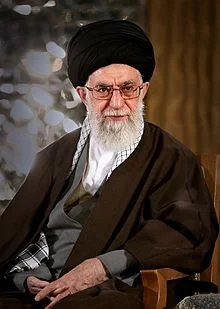
Sayyed Ali Hosseini Khamenei سید علی حسینی خامنهای pronounced, after the
death of Ruhollah Khomeini ayatullah Uzma Ali Khamenei was elected as the new
superem leader of Iran by Assembly of Experts on 4 June 1989, at
age 49,
Ali khameoni is the second and current suprem leader of Iran, Current
Iranian president Hassan Rohani arranged for Khamenei to get his
first major post in the provisional revolutionary government as deputy defense
minister. Khamenei also served as th resident if Iran from 1981 to
1989. In 2012, 2013, and 2014 Forbes selected him 21st, 23rd, and 19th,
respectively, in the list of The World's Most Powerful People.
 Khamenei is the second longest serving
autocrat in the Middle East (after Oman’s Sultan Qaboos) as well as the second longest-serving Iranian
leader of the last century, after Shah Mohammed Reza Pahlavi. Khamenei
is a head of state and also chief
commander of the armed forces, and is considered the most powerful political
authority in Iran. Khamenei issues decrees and makes the final decisions
on economy, environment, foreign policy and everything else in Iran. In
August 2016, Khamenei directly warned the current president Hassan Rouhani that there should be no deviation from
Khamenei's economic policies. Khamenei controls an organization
called Setad that was worth at least $95 billion in 2015. Setad
gives Khamenei financial independence from parliament and the national budget.
Khamenei is the second longest serving
autocrat in the Middle East (after Oman’s Sultan Qaboos) as well as the second longest-serving Iranian
leader of the last century, after Shah Mohammed Reza Pahlavi. Khamenei
is a head of state and also chief
commander of the armed forces, and is considered the most powerful political
authority in Iran. Khamenei issues decrees and makes the final decisions
on economy, environment, foreign policy and everything else in Iran. In
August 2016, Khamenei directly warned the current president Hassan Rouhani that there should be no deviation from
Khamenei's economic policies. Khamenei controls an organization
called Setad that was worth at least $95 billion in 2015. Setad
gives Khamenei financial independence from parliament and the national budget.
Khamenei has control over the executive,
legislative and judicial branches of government, as well as the military and
media. Over the years, to cement his power base, Khamenei has also
developed close relations with the military and security apparatus. He has
built a vast bureaucracy inside the government and around his compound Beit Rahbari. All candidates to the Assembly of Experts,
the President and the Majlis (Parliament), are vetted by the Guardian Council, whose members are selected directly or
indirectly by the Supreme Leader of Iran. There have been also instances
when the Guardian Council reversed
its ban of particular people after being ordered to do so by
Khamenei. Khamenei has also fired and reinstated Presidential cabinet
appointments. Iran's Chief Justice, a Khamenei appointee, has warned the
president of Iran against voicing opposition to Khamenei, and also stated
that it is illegal for the Assembly of Experts to
supervise Khamenei. In 2016, Khamenei ordered Mahmoud Ahmadinejad, his
former ally with whom his relationship was strained after Ahmadinejad accused
his son Mojtaba Khamenei of
embezzling from the state treasury, to not run for president again.
There have been several major protests during
Khamenei's reign, including the Iran student protests, July
1999, 2009 Iranian
presidential election protests, when protesters chanted "death
to the dictator", and ripped down pictures of Khamenei, as well
as the 2011–12 Iranian protests,
among others.
Khamenei was the victim of an attempted
assassination in June 1981 that paralysed his right arm. According to his
official website, Khamenei was arrested six times before being sent into exile
for three years during Mohammad Reza Pahlavi's reign. Six months after
the 2003 invasion of Iraq,
which aimed to disarm Iraq of never found weapons of mass destruction, Ali Khamenei
issued a fatwa saying that the production, stockpiling, and use
of weapons of mass destruction are
forbidden. Khamenei is considered above criticism, and Iranians are
regularly punished for insulting him.

